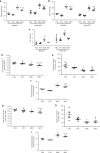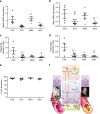XX sex chromosome complement promotes atherosclerosis in mice
- PMID: 31201301
- PMCID: PMC6643208
- DOI: 10.1038/s41467-019-10462-z
XX sex chromosome complement promotes atherosclerosis in mice
Abstract
Men and women differ in circulating lipids and coronary artery disease (CAD). While sex hormones such as estrogens decrease CAD risk, hormone replacement therapy increases risk. Biological sex is determined by sex hormones and chromosomes, but effects of sex chromosomes on circulating lipids and atherosclerosis are unknown. Here, we use mouse models to separate effects of sex chromosomes and hormones on atherosclerosis, circulating lipids and intestinal fat metabolism. We assess atherosclerosis in multiple models and experimental paradigms that distinguish effects of sex chromosomes, and male or female gonads. Pro-atherogenic lipids and atherosclerosis are greater in XX than XY mice, indicating a primary effect of sex chromosomes. Small intestine expression of enzymes involved in lipid absorption and chylomicron assembly are greater in XX male and female mice with higher intestinal lipids. Together, our results show that an XX sex chromosome complement promotes the bioavailability of dietary fat to accelerate atherosclerosis.
Conflict of interest statement
The authors declare no competing interests.
Figures





References
Publication types
MeSH terms
Substances
Grants and funding
- S10 OD021753/OD/NIH HHS/United States
- U2C DK059630/DK/NIDDK NIH HHS/United States
- DK120342/U.S. Department of Health & Human Services | National Institutes of Health (NIH)/International
- 18SFRB339001/American Heart Association (American Heart Association, Inc.)/International
- R01 HD076125/HD/NICHD NIH HHS/United States
- P01 HL028481/HL/NHLBI NIH HHS/United States
- GM103527/U.S. Department of Health & Human Services | National Institutes of Health (NIH)/International
- HL120507/U.S. Department of Health & Human Services | National Institutes of Health (NIH)/International
- HL107326/U.S. Department of Health & Human Services | National Institutes of Health (NIH)/International
- HL028481/U.S. Department of Health & Human Services | National Institutes of Health (NIH)/International
- DK049630/U.S. Department of Health & Human Services | National Institutes of Health (NIH)/International
- R01 DK083561/DK/NIDDK NIH HHS/United States
- R01 HL107326/HL/NHLBI NIH HHS/United States
- K99 ES028734/ES/NIEHS NIH HHS/United States
- R56 DK083561/DK/NIDDK NIH HHS/United States
- P30 GM127211/GM/NIGMS NIH HHS/United States
- U54 DK120342/DK/NIDDK NIH HHS/United States
- DK 083561/U.S. Department of Health & Human Services | National Institutes of Health (NIH)/International
- ES028734/U.S. Department of Health & Human Services | National Institutes of Health (NIH)/International
- R01 HL120507/HL/NHLBI NIH HHS/United States
- 0D021753/U.S. Department of Health & Human Services | National Institutes of Health (NIH)/International
- GM127211/U.S. Department of Health & Human Services | National Institutes of Health (NIH)/International
- P20 GM103527/GM/NIGMS NIH HHS/United States
- HD 076125/U.S. Department of Health & Human Services | National Institutes of Health (NIH)/International
LinkOut - more resources
Full Text Sources
Medical
Molecular Biology Databases
Miscellaneous

